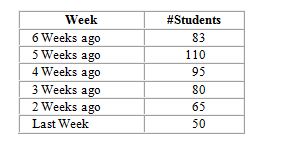Professor Very Busy needs to allocate time next week to include time for office hours. He needs to forecast the number of students who will seek appointments. He has gathered the following data: 
What is this week's forecast using trend-adjusted (double) smoothing with alpha = .5 and beta = .1, if the forecast for last week was 65, the forecast for two weeks ago was 75, and the trend estimate for last week's forecast was -5?
Definitions:
Stratospheric Ozone
A layer of ozone molecules located in the Earth's stratosphere that absorbs and protects living organisms from the harmful effects of the sun's ultraviolet radiation.
Ultraviolet Radiation
Electromagnetic radiation with a wavelength shorter than that of visible light, but longer than X-rays, which can have effects on the skin such as sunburns and vitamin D synthesis.
Gamma Radiation
Electromagnetic radiation of high frequency and thus high energy, often emitted by radioactive materials.
Air Pollution
The presence of substances in the air that are harmful to human health, the environment, or the climate.
Q2: One concern in the design of production
Q4: Which term most closely relates to associative
Q12: Which of the following is not an
Q23: When buying component parts, risk does not
Q24: Capacity increases are usually acquired in fairly
Q26: A Virginia county is considering whether to
Q26: The fundamental purpose for the existence of
Q44: Service typically involves a much higher degree
Q79: A company is designing a product layout
Q101: Trust is a factor influencing productivity.